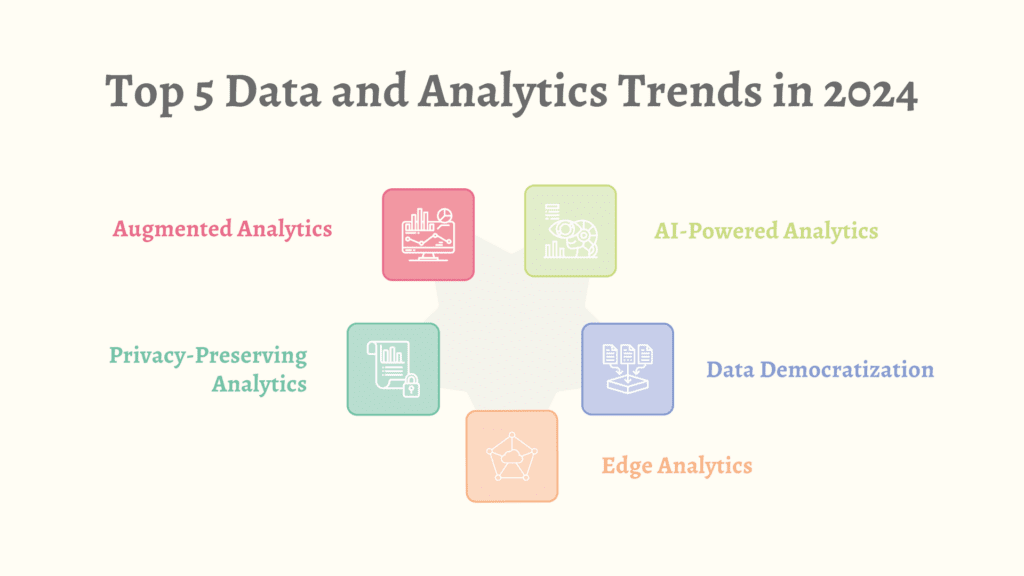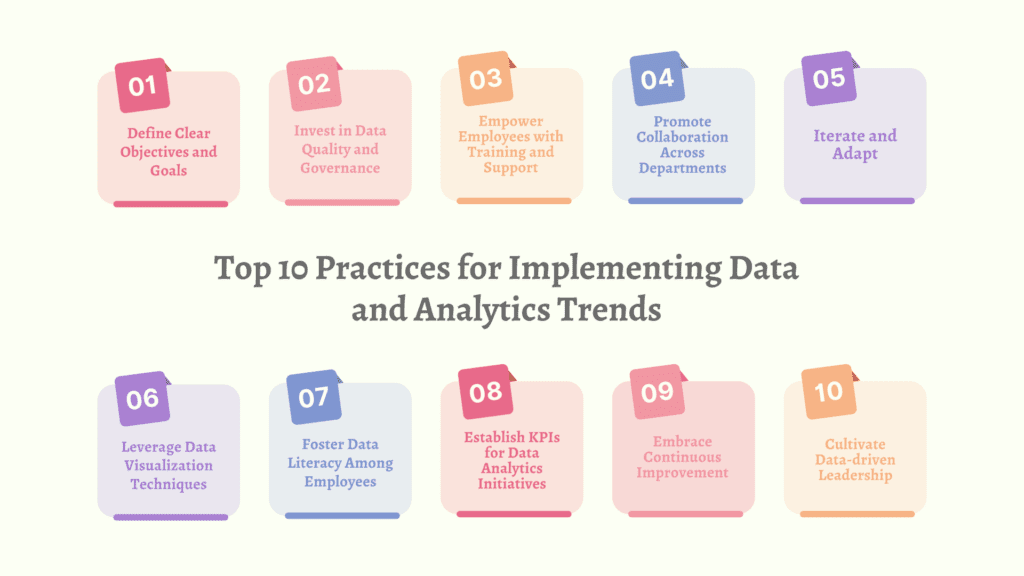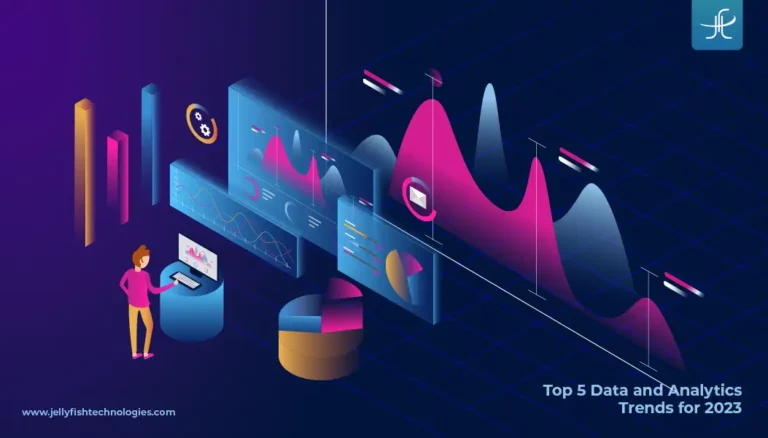In recent years, technological advancements have revolutionized the way we manage and utilize data. Today, data analytics stands out as a cornerstone for informed decision-making, strategic planning, and operational efficiency.
According to Statista, the global big data analytics market was valued at over 240 billion U.S. dollars in 2021 and is expected to see significant growth over the coming years, with a forecasted market value of over 650 billion dollars by 2029.
As we embark on the journey into 2024, the importance of leveraging data and analytics cannot be emphasized enough. It’s not just a passing trend; rather, it represents a fundamental shift in how organizations navigate and excel in today’s fiercely competitive landscape.
The Evolving Landscape of Data and Analytics
The evolution of data and analytics has been nothing short of revolutionary. From its humble beginnings as a tool for retrospective analysis, it has evolved into a proactive force driving innovation and growth across industries.
One of the defining characteristics of this evolution is the shift toward real-time insights. Organizations no longer rely solely on historical data to make decisions; they demand timely, actionable insights that empower them to anticipate trends, identify opportunities, and mitigate risks in real-time.
This shift is driving the adoption of cutting-edge technologies, such as AI, machine learning, and predictive analytics, enabling organizations to extract valuable insights from vast volumes of data with unprecedented speed and accuracy.
Furthermore, the democratization of data is another notable trend shaping the landscape. Today, organizations are empowering employees at all levels with the tools and skills they need to leverage data effectively, fostering a culture of data-driven decision-making from the ground up.
Amid this evolution, organizations are also grappling with the challenges of data governance, privacy, and security. With the proliferation of data sources and the increasing complexity of regulatory requirements, ensuring the integrity and security of data assets has become a top priority for businesses across industries.
As we navigate the evolving landscape of data and analytics in 2024, organizations must embrace a forward-thinking mindset, leveraging the latest technologies, best practices, and strategic partnerships to stay ahead of the curve. At Jellyfish Technologies, we are committed to helping organizations unlock the full potential of data analytics through our comprehensive suite of data analytics consulting services and solutions. Join us on this journey as we explore the trends, challenges, and opportunities that lie ahead in the world of data analytics.
Top 5 Data and Analytics Trends in 2024
Let’s delve into the top five trends that will dominate the data and analytics landscape in 2024.

AI-Powered Analytics
Artificial Intelligence (AI) continues to revolutionize the field of data analytics, enabling organizations to extract actionable insights from vast datasets with unprecedented accuracy and efficiency. In 2024, we can expect to see a surge in the adoption of AI-powered analytics solutions, as businesses seek to harness the power of machine learning algorithms to uncover hidden patterns, trends, and correlations in their data.
From predictive analytics to natural language processing, AI-powered analytics tools empower organizations to make data-driven decisions faster and more effectively than ever before. Furthermore, by automating repetitive tasks and identifying complex relationships within data, these AI solutions enable businesses to unlock new opportunities for growth and innovation.
Data Democratization
The democratization of data is another key trend that will continue to gain momentum in 2024. As organizations recognize the value of empowering employees at all levels to access and analyze data, we can expect to see a shift towards more inclusive data governance models and self-service analytics platforms.
By democratizing data, organizations can break down silos, foster collaboration, and enable data-driven decision-making at every level of the organization. This trend not only enhances operational efficiency but also drives innovation by empowering employees to uncover insights and identify opportunities that may have otherwise gone unnoticed.
Edge Analytics
With the proliferation of Internet of Things (IoT) devices and the rise of edge computing technologies, edge analytics is poised to become a game-changer in 2024.
From manufacturing to healthcare to retail, industries across the board are embracing edge analytics to improve operational efficiency, enhance customer experiences, and drive innovation. As the volume of data generated at the edge continues to grow, we can expect to see a surge in demand for edge analytics solutions that enable organizations to extract actionable insights from this data in real time.
Privacy-Preserving Analytics
With increasing concerns about data privacy and security, privacy-preserving analytics is set to become a top priority for organizations in 2024. As regulations, such as GDPR and CCPA continue to evolve, businesses are under increasing pressure to protect sensitive data and ensure compliance with stringent privacy requirements.
In response to these challenges, we can expect to see a rise in privacy-preserving analytics solutions that enable organizations to analyze sensitive data while preserving individual privacy rights. From homomorphic encryption to differential privacy techniques, these solutions offer innovative approaches to data analytics that prioritize privacy and security without compromising on the quality or accuracy of insights.
Augmented Analytics
Augmented analytics, which combines AI and machine learning with human intelligence to enhance the analytics process, is poised to revolutionize the way organizations derive insights from their data in 2024.
From automated insights generation to natural language querying, augmented analytics tools empower users of all skill levels to access and analyze data more effectively than ever before. Furthermore, by augmenting human intelligence with machine learning algorithms, organizations can uncover insights and identify opportunities that may have otherwise gone unnoticed, driving competitive advantage and fueling growth.
Curious about the advantages of data visualization? Explore the compelling insights at Amazing Benefits of Data Visualization That Every Business Should Know in 2023.
Challenges in Adopting Data and Analytics Trends
| Topic | Challenges | Solutions |
|---|---|---|
| Data Quality and Integration | Ensuring the quality and consistency of data across various sources and platforms is a significant challenge. | Implementing data quality management tools and establishing robust data integration processes can help ensure that organizations have access to accurate and reliable data for analysis. |
| Skills Gap | The shortage of skilled data analysts and data scientists remains a major obstacle for organizations. | Investing in employee training and development programs, as well as collaborating with educational institutions, can help bridge the skills gap and cultivate a workforce with the necessary expertise in data analytics. |
| Data Security and Privacy | Protecting sensitive data from cyber threats and ensuring compliance with privacy regulations, such as GDPR and CCPA poses significant challenges. | Implementing robust data security measures, including encryption and access controls, as well as adopting privacy-preserving analytics techniques can help mitigate the risks associated with data breaches and regulatory non-compliance. |
| Cost and Complexity | Implementing and maintaining data analytics solutions can be costly and complex, particularly for small and medium-sized businesses. | Exploring alternative deployment models, such as cloud-based analytics platforms can help reduce costs and complexity while still reaping the benefits of data analytics. |
| Change Management | Driving cultural and organizational change to foster a data-driven mindset can be challenging, particularly in organizations with entrenched legacy processes and systems. | Engaging stakeholders, fostering a culture of collaboration and innovation, and providing ongoing training and support can help overcome resistance to change and drive the adoption of data analytics trends across the organization. |
Best Practices for Implementing Data and Analytics Trends
Implementing data and analytics trends requires careful planning, execution, and ongoing management to ensure success. Here are some detailed best practices to guide organizations in effectively adopting and integrating these trends.

Define Clear Objectives and Goals
Before diving into data analytics initiatives, organizations need to define clear objectives and goals. This involves aligning data analytics efforts with overarching business strategies and identifying specific outcomes and success metrics.
Whether the goal is to improve operational efficiency, enhance customer experiences, or drive revenue growth, having clearly defined objectives provides a roadmap for the implementation process.
Invest in Data Quality and Governance
Organizations should invest in data quality management tools and establish robust data governance processes to ensure the accuracy, consistency, and integrity of their data assets. This includes implementing data validation checks, cleansing procedures, and metadata management practices to maintain data quality throughout its lifecycle.
Also read: The Art Of IT Staff Augmentation: Trending Approach To Supercharge Your Business
By prioritizing data quality and governance, organizations can trust the insights derived from their analytics initiatives and make informed decisions based on reliable data.
Empower Employees with Training and Support
Data analytics tools and techniques can be complex, and employees may require training and support to effectively utilize them. Therefore, organizations should invest in comprehensive training programs that cover both technical aspects, such as using analytics software and interpreting results, and soft skills, such as data storytelling and communication.
Providing ongoing support through forums, workshops, and coaching sessions ensures that employees feel confident and capable in their data analytics endeavors. Additionally, fostering a culture of continuous learning encourages employees to stay updated on the latest trends and technologies in the field of data analytics.
Promote Collaboration Across Departments
Data analytics initiatives often require collaboration across various departments and teams within an organization. Therefore, by breaking down silos and promoting cross-functional collaboration, organizations can leverage diverse perspectives and expertise to drive successful outcomes.
Encouraging open communication channels, establishing interdisciplinary project teams, and hosting regular brainstorming sessions facilitate knowledge sharing and idea generation. Furthermore, cross-departmental collaboration also ensures that data analytics efforts are aligned with business objectives and that insights are relevant and actionable across the organization.
Data Management Software for Insurance Brokerage Firm
Iterate and Adapt
Organizations should adopt an agile approach to data analytics, where experimentation, iteration, and adaptation are encouraged. This involves regularly reviewing and analyzing results, identifying areas for optimization, and making adjustments to algorithms, models, and strategies as needed.
By embracing a culture of experimentation and learning from both successes and failures, organizations can continuously enhance their data analytics capabilities and stay ahead of evolving trends and market dynamics.
Leverage Data Visualization Techniques
Visual representations such as charts, graphs, and dashboards can simplify complex datasets, making it easier for decision-makers to understand trends, patterns, and outliers at a glance. By incorporating interactive and dynamic visualizations, organizations can encourage exploration and discovery, fostering a deeper understanding of data-driven insights.
If you’re interested in learning more about big data visualization challenges and tools, then you may like this: Big Data Visualization: Tools and Challenges.
Foster Data Literacy Among Employees
Empowering employees with the knowledge and skills to interpret and analyze data enables them to contribute meaningfully to data-driven initiatives and make informed decisions based on evidence.
Furthermore, by fostering a culture of data literacy, organizations can democratize data access and promote a shared understanding of data across all levels of the organization.
Establish Key Performance Indicators (KPIs) for Data Analytics Initiatives
These KPIs should align with organizational goals and objectives, providing a tangible framework for evaluating the effectiveness of data-driven strategies.
Whether it’s tracking improvements in operational efficiency, customer satisfaction, or revenue growth, establishing clear KPIs helps organizations monitor progress, identify areas for improvement, and demonstrate the value of data analytics investments to stakeholders.

Embrace Continuous Improvement
Embrace a culture of continuous improvement by regularly reviewing and refining data analytics processes, methodologies, and technologies. Encourage feedback from users and stakeholders, identify opportunities for optimization, and prioritize initiatives that deliver the greatest value to the organization.
By embracing a mindset of continuous improvement, organizations can stay agile and responsive to changing business needs, ensuring that their data analytics capabilities remain relevant and effective in the long term.
Cultivate Data-driven Leadership
Foster data-driven leadership by empowering executives and decision-makers with the insights and tools they need to leverage data effectively in their decision-making processes.
By cultivating data-driven leadership, organizations can ensure alignment between strategic objectives and data analytics efforts, driving organizational success and competitive advantage in an increasingly data-driven world.
Conclusion
Looking beyond 2024, the future of data and analytics holds immense promise for organizations willing to embrace change, foster a culture of innovation, and prioritize ethical data usage.
At Jellyfish Technologies, we are committed to helping organizations navigate the complexities of the data and analytics landscape, unlock the full potential of their data assets, and drive meaningful business outcomes. Through our comprehensive suite of data analytics consulting services and solutions, we empower organizations to stay ahead of the curve and thrive in an increasingly data-driven world.
We would love to hear your comments relating to the post. Do you have some other thoughts? Drop us words through our contact page.


